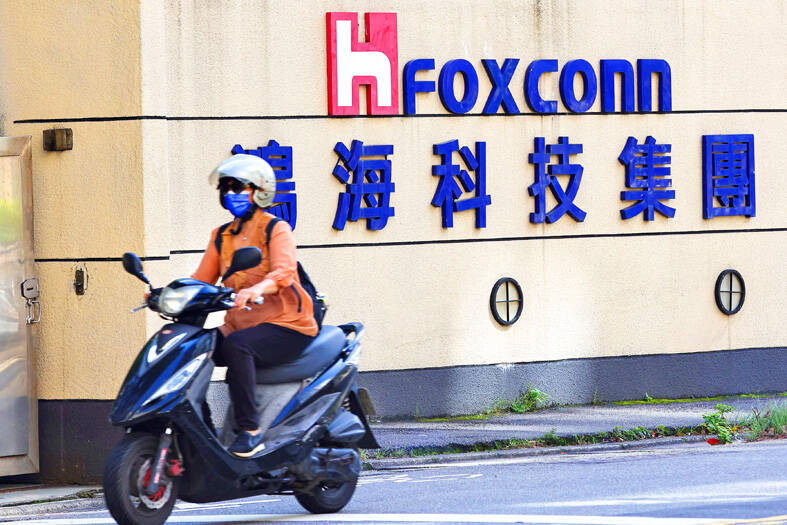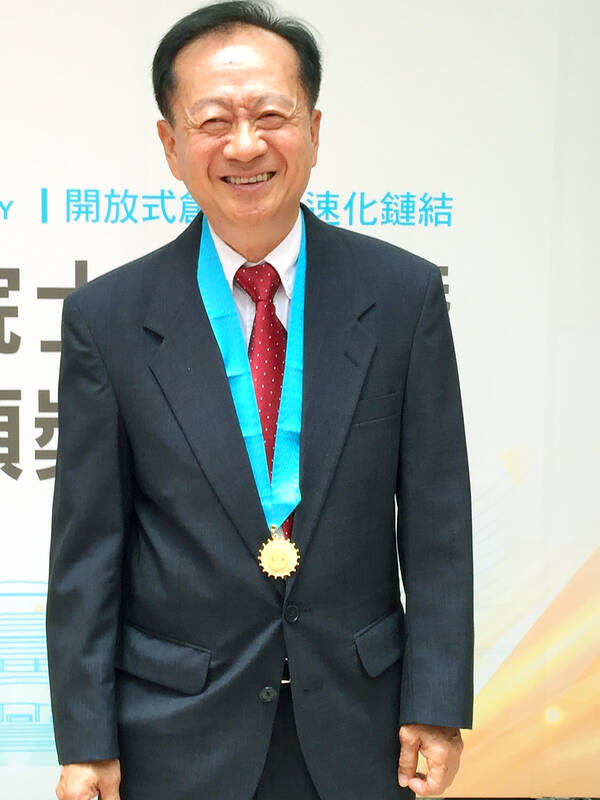Hon Hai Technology Group (鴻海科技集團) has hired former Taiwan Semiconductor Manufacturing Co (TSMC, 台積電) cochief operating officer Chiang Shang-yi (蔣尚義) as a strategy officer to assist its semiconductor business development, the group said yesterday.
Chiang’s appointment took effect immediately. He is to report directly to Hon Hai chairman Young Liu (劉揚偉).
Chiang was the central figure in TSMC’s technology advancement, and once considered a potential successor to TSMC founder and former chairman Morris Chang (張忠謀). He spent the past few years in China assisting Chinese chipmakers Semiconductor Manufacturing International Corp (中芯國際) and Wuhan Hongxin Semiconductor Corp (武漢弘芯半導體).

Photo: Ann Wang, Reuters
Chiang on Oct. 18 attended a Hon Hai technology forum in Taipei, prompting speculation that he might join the Apple Inc supplier.
Bob Chen (陳偉銘), president of Hon Hai’s semiconductor business group, is a former colleague of Chiang’s from TSMC.
“Chiang’s rich experience in the semiconductor industry will provide Hon Hai invaluable support for the group’s global semiconductor deployment strategy and technical guidance,” Liu said in a statement. “We are grateful to have such a seasoned semiconductor veteran join us at this important juncture in the group’s development.”

File photo: Liberty Times
Hon Hai last year accelerated the pace of its semiconductor capacity deployment in response to rising customer demand following a two-year chip crunch, Liu said in August.
The iPhone assembler purchases about US$60 billion of chips a year, and would focus on making chips used in electric vehicles and electronics, he said, adding that the company would not compete with chipmakers.
Hon Hai has said it is looking to build semiconductor capacity in Malaysia and India through its partnerships with local companies.
The company said it hopes its efforts in developing microcontrollers, power semiconductors, and light detection and ranging technology would bear fruit within three years.
It also said it expects to launch volume production of chips using mature technology in 2024 and start supplying auto chips to customers in 2025.
In related news, Intel Corp executive Randhir Thakur, who oversaw a key part of the company’s comeback plan — its push into the contract-manufacturing industry — is leaving the chipmaker.
Thakur “has decided to step down from his position to pursue opportunities outside the company,” Intel said in an e-mailed statement on Monday. “He will stay on through the first quarter of 2023 to ensure a smooth transition to a new leader.”
The departure marks a shakeup for chief executive officer Pat Gelsinger’s turnaround plan.
After losing its role as the leader of the US$580 billion chip industry, Intel has set out to expand its operations. That includes becoming a so-called foundry — a business that makes chips for other companies. It is an area dominated by TSMC and Samsung Electronics Co, two companies that are unlikely to cede their territory easily.
Additional reporting by Bloomberg

Intel Corp chief executive officer Lip-Bu Tan (陳立武) is expected to meet with Taiwanese suppliers next month in conjunction with the opening of the Computex Taipei trade show, supply chain sources said on Monday. The visit, the first for Tan to Taiwan since assuming his new post last month, would be aimed at enhancing Intel’s ties with suppliers in Taiwan as he attempts to help turn around the struggling US chipmaker, the sources said. Tan is to hold a banquet to celebrate Intel’s 40-year presence in Taiwan before Computex opens on May 20 and invite dozens of Taiwanese suppliers to exchange views

Application-specific integrated circuit designer Faraday Technology Corp (智原) yesterday said that although revenue this quarter would decline 30 percent from last quarter, it retained its full-year forecast of revenue growth of 100 percent. The company attributed the quarterly drop to a slowdown in customers’ production of chips using Faraday’s advanced packaging technology. The company is still confident about its revenue growth this year, given its strong “design-win” — or the projects it won to help customers design their chips, Faraday president Steve Wang (王國雍) told an online earnings conference. “The design-win this year is better than we expected. We believe we will win

Chizuko Kimura has become the first female sushi chef in the world to win a Michelin star, fulfilling a promise she made to her dying husband to continue his legacy. The 54-year-old Japanese chef regained the Michelin star her late husband, Shunei Kimura, won three years ago for their Sushi Shunei restaurant in Paris. For Shunei Kimura, the star was a dream come true. However, the joy was short-lived. He died from cancer just three months later in June 2022. He was 65. The following year, the restaurant in the heart of Montmartre lost its star rating. Chizuko Kimura insisted that the new star is still down

While China’s leaders use their economic and political might to fight US President Donald Trump’s trade war “to the end,” its army of social media soldiers are embarking on a more humorous campaign online. Trump’s tariff blitz has seen Washington and Beijing impose eye-watering duties on imports from the other, fanning a standoff between the economic superpowers that has sparked global recession fears and sent markets into a tailspin. Trump says his policy is a response to years of being “ripped off” by other countries and aims to bring manufacturing to the US, forcing companies to employ US workers. However, China’s online warriors